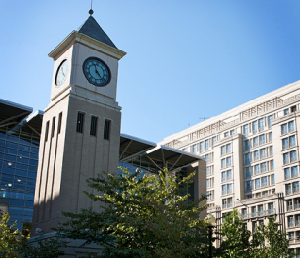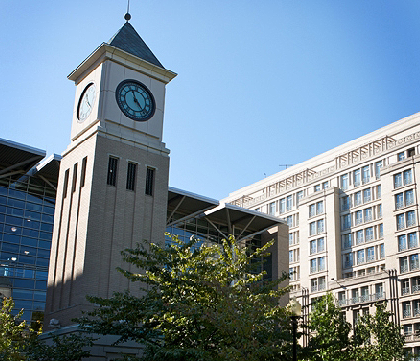
The GULC, pictured above, received a letter from FIRE, a nonprofit advocating for individual rights at American universities on behalf of students restricted from political campaigning on campus.
Georgetown University Law Center Dean William Treanor received an open letter from the Foundation of Individual Rights in Education Feb. 1 urging the university to revise its student organization policy after the center banned students from campaigning for presidential candidates.
The GULC cites its tax-exempt status as grounds to prohibit political campaign-related activities on campus.
FIRE, a nonprofit that seeks to promote individual rights at American colleges and universities, wrote its letter on behalf of Alexander Atkins (LAW ’17) and other law students who comprised an informal grass-roots group supporting Sen. Bernie Sanders (I-Vt.).
The Office of Student Life rejected the student group’s request for a table outside of Georgetown Law’s McDonough Hall in September. The group then opted for cafeteria tables but was asked to leave on the day of the first Democratic debate on October 13 by university officials who cited the center’s policy governing partisan political speech.
According to the GULC’s Student Organization Policy on Partisan Political Activities, under the 501(c)(3) category of the Internal Revenue Code that grants tax exemption to nonprofit organizations, the university cannot engage in political campaign activity.
“Georgetown University and the Law Center must generally avoid engaging in partisan political campaign activity and must restrict the use of University resources in support of such activity,” the policy reads.
In FIRE’s letter, Senior Program Officer Marieke Tuthill Beck-Coon asked the GULC to review its broad interpretation of the policy, emphasizing the nonprofit’s disagreement with the university’s decision to extend the restrictions to student groups who campaign for a candidate. “We are asking Georgetown Law to re-evaluate its policies and be more permissive of students’ political speech and campaigning on campus, because it’s not necessary under 501(c)(3) for them to interpret such a broad ban,” Beck-Coon said to The Hoya. “They’re taking an over-cautious and over-broad approach that they clearly need to reevaluate in light of what is clearly important to their students and the values that the school claims to hold.”
Atkins said his student group discovered FIRE as it was further investigating 501(c)(3). FIRE offered to write a letter to Treanor on the students’ behalf, and though they were initially reluctant, they eventually agreed after communication with GULC administrators began to falter.
“I would say the initial reactions where I was seeking out what the policy was and the rationale behind it was, I would characterize the responses as prompt and concise and respectful, just kind of in very concrete terms explaining what the policy was,” Atkins said. “As I tried to seek greater clarity as to what the exact rationale, or justification behind the policy was, it was a little bit harder to get real answers. If we had it our way, we wouldn’t have had FIRE intervene on our behalf at all. We reached a point where we felt we weren’t being responded to.”
In an email to The Hoya, the GULC stated that, after receiving FIRE’s letter, it is exploring new ways to reconcile student political expression and the parameters established by the university’s tax-exempt status.
“Georgetown Law values political expression, and is committed to encouraging it while remaining true to our obligation as a nonprofit to remain politically neutral. As such we place limits on the use of university resources to distribute campaign materials,” the statement reads. “The Law Center is currently working on new ways to protect our students’ right to advocate for the political candidates of their choice, while still remaining within the bounds that our 501(c)(3) status imposes.”
Beck-Coon stressed that the situation at Georgetown is not unprecedented, pointing to the letters FIRE has sent to universities in previous election cycles, including Michigan State University in 2012, Montclair State University in 2014 and American University in 2015.
Beck-Coon said that, in general, private universities are more susceptible to a broader application of 501(c)(3), because private institutions do not operate under the state and therefore are not accountable to the First Amendment as public institutions are.
“Most likely because public institutions know that they have to respect the First Amendment rights of their students, which absolutely protect political speech and partisan political speech, I think they are more aware of the tension between free speech and an overbroad interpretation of 501(c)(3),” Beck-Coon said to The Hoya. “Private institutions are technically not required under the law to respect the rights of these students, because they’re not state actors.”
Beck-Coon also stressed that the restriction of students’ partisan speech is not conducive to fostering a rich academic community.
“Political and civic engagement are a huge part of education and a huge part of the academic community that is meant to promote discussion, learning, engagement,” Beck-Coon said. “This is when students should be discussing their issues, should be discussing their candidates, and an institution of higher education has an obligation to promote that kind of dialogue rather than suppress it.”
Atkins expressed the belief that the issue is indicative of a broader cultural shortcoming in the United States.
“Frankly, I think this is a tiny example of a much larger problem that the larger country faces where for whatever reason, we’ve gotten into this national cliche where the one thing you don’t talk about in public is politics, when in reality it is one of the most important things to our society,” Atkins said. “I do think it’s ironic that in the best law school in the nation’s capital, the political center of the country, students are being prevented from advocating on behalf of specific candidates for office.”





















